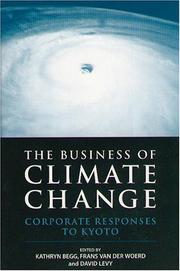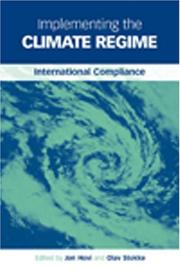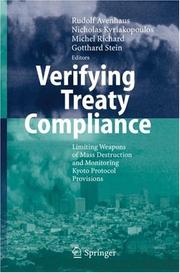| Listing 1 - 9 of 9 |
Sort by
|

ISBN: 1874719578 9786610155545 1909493481 128015554X 1351281682 9781909493483 9781874719571 9781280155543 6610155542 9781351281683 9781351281652 1351281674 1351281666 Year: 2017 Publisher: London : Routledge,
Abstract | Keywords | Export | Availability | Bookmark
 Loading...
Loading...Choose an application
- Reference Manager
- EndNote
- RefWorks (Direct export to RefWorks)
"In recent years climate change has become a leading issue on both the business and political agenda. With the Kyoto Protocol to the UN Framework Convention on Climate Change now ratified, business is bracing itself for the reality of serious regulation on the reduction of greenhouse gas emissions.The Business of Climate Change presents a state-of-the-art analysis of corporate responses to the climate change issue. The book describes and assesses a number of recent business approaches that will help to identify effective strategies and promote the dissemination of proactive corporate practices on climate change worldwide. By identifying the factors that cause companies to pursue low-carbon strategies and support the Kyoto process, the book will also be helpful to governments in formulating policy.Business and industry have a crucial role to play in the implementation of the Kyoto Protocol. They are major emitters of greenhouse gases, and pressure is mounting for them to engage in a range of mitigation strategies, from emission inventorying and trading schemes to investments in low-carbon technologies. Behind the scenes a number of companies have started to develop strategies to curtail greenhouse gas emissions.These strategies can be very diverse in nature. At a political level, companies try to influence policy implementation and, more specifically, to test ideas in anticipation of possible regulation on the climate change issue. At a more practical level, there are a burgeoning number of initiatives to conserve energy use in production, transportation and buildings, to develop renewable sources of energy, to measure carbon emissions and sequestration at a detailed level, and to develop various markets for trading carbon credits among companies and countries. Some technologies, such as hybrid cars and compact fluorescent lighting, are now market realities.Common to all of these initiatives is that they operate in an environment of high complexity and uncertainty. The political implementation of the Kyoto Protocol remains uncertain and many details remain unspecified. Economic instruments such as emission trading are favoured, but their mechanisms are still hotly debated and the future price of credits is unknown. New markets for low-emission products and technologies are beginning to appear, but there are currently few regulatory drivers to assist their development. The impact of potential regulation on business will vary tremendously between companies and sectors. The fossil fuel and energy sectors fear the economics of action, while sectors such as insurance and agriculture fear the economics of inaction. Combined with the remaining uncertainties about what form climate change may take, corporate responses to reduce risks have to differentiate between sectors and have to be flexible. For individual companies, these big uncertainties demand new thinking and contingency planning.The Business of Climate Change is split into four sections: "Introduction and overview" presents a broad perspective on business and climate policies"--Provided by publisher.
Air -- Pollution -- Economic aspects. --- Climatic changes -- Economic aspects. --- Climatic changes -- Government policy. --- United Nations Framework Convention on Climate Change (1992). Protocols, etc., 1997 December 11. --- Air --- Climatic changes --- Environmental policy --- Business & Economics --- Economic History --- Pollution --- Economic aspects --- Government policy --- Environmental policy. --- Economic aspects. --- Government policy. --- United Nations Framework Convention on Climate Change --- milieuproblematiek --- duurzame ontwikkeling --- duurzaam ondernemen --- broeikaseffect --- milieubeleid --- Environment and state --- Environmental control --- Environmental management --- Environmental protection --- Environmental quality --- State and environment --- Jingdu tiao yue --- Jingdu xie yi shu --- Jingdu yi ding shu --- Konvensi Perubahan Iklim --- Kyōto giteisho --- Kyoto Protocol --- Kyoto Treaty --- Lian he guo qi hou bian hua kuang jia gong yue de Jingdu yi ding shu --- Protokol Kyoto --- Protokol Kyoto Untuk Konvensi Kerangka Kerja PBB Tentang Perubahan Iklim --- 京都协议书 --- 京都条约 --- 京都議定書 --- 京都议定书 --- 联合国气候变化框架公约的京都议定书 --- Environmental auditing --- Atmosphere --- Pollution&delete&

ISBN: 0691120269 0691088705 9786613379832 1400824060 128337983X 1400814774 9780691120263 9781400814770 9781400824069 9780691088709 1400818508 Year: 2011 Publisher: Princeton, NJ
Abstract | Keywords | Export | Availability | Bookmark
 Loading...
Loading...Choose an application
- Reference Manager
- EndNote
- RefWorks (Direct export to RefWorks)
Even as the evidence of global warming mounts, the international response to this serious threat is coming unraveled. The United States has formally withdrawn from the 1997 Kyoto Protocol; other key nations are facing difficulty in meeting their Kyoto commitments; and developing countries face no limit on their emissions of the gases that cause global warming. In this clear and cogent book-reissued in paperback with an afterword that comments on recent events--David Victor explains why the Kyoto Protocol was never likely to become an effective legal instrument. He explores how its collapse offers opportunities to establish a more realistic alternative. Global warming continues to dominate environmental news as legislatures worldwide grapple with the process of ratification of the December 1997 Kyoto Protocol. The collapse of the November 2000 conference at the Hague showed clearly how difficult it will be to bring the Kyoto treaty into force. Yet most politicians, policymakers, and analysts hailed it as a vital first step in slowing greenhouse warming. David Victor was not among them. Kyoto's fatal flaw, Victor argues, is that it can work only if emissions trading works. The Protocol requires industrialized nations to reduce their emissions of greenhouse gases to specific targets. Crucially, the Protocol also provides for so-called "emissions trading," whereby nations could offset the need for rapid cuts in their own emissions by buying emissions credits from other countries. But starting this trading system would require creating emission permits worth two trillion dollars--the largest single invention of assets by voluntary international treaty in world history. Even if it were politically possible to distribute such astronomical sums, the Protocol does not provide for adequate monitoring and enforcement of these new property rights. Nor does it offer an achievable plan for allocating new permits, which would be essential if the system were expanded to include developing countries. The collapse of the Kyoto Protocol--which Victor views as inevitable--will provide the political space to rethink strategy. Better alternatives would focus on policies that control emissions, such as emission taxes. Though economically sensible, however, a pure tax approach is impossible to monitor in practice. Thus, the author proposes a hybrid in which governments set targets for both emission quantities and tax levels. This offers the important advantages of both emission trading and taxes without the debilitating drawbacks of each. Individuals at all levels of environmental science, economics, public policy, and politics-from students to professionals--and anyone else hoping to participate in the debate over how to slow global warming will want to read this book.
-Greenhouse gas mitigation --- -Abatement of greenhouse gas emissions --- Pollution prevention --- Warming, Global --- Global temperature changes --- Jingdu tiao yue --- Jingdu xie yi shu --- Jingdu yi ding shu --- Konvensi Perubahan Iklim --- Kyōto giteisho --- Kyoto Protocol --- Kyoto Treaty --- Lian he guo qi hou bian hua kuang jia gong yue de Jingdu yi ding shu --- Protokol Kyoto --- Protokol Kyoto Untuk Konvensi Kerangka Kerja PBB Tentang Perubahan Iklim --- 京都协议书 --- 京都条约 --- 京都議定書 --- 京都议定书 --- 联合国气候变化框架公约的京都议定书 --- Greenhouse gas mitigation --- Global warming --- Abatement of greenhouse gas emissions --- Emission reduction, Greenhouse gas --- Emissions reduction, Greenhouse gas --- GHG mitigation --- Greenhouse gas abatement --- Greenhouse gas emission reduction --- Greenhouse gas emissions reduction --- Greenhouse gas reduction --- Mitigation of greenhouse gas emissions --- Reduction of greenhouse gas emissions --- Government policy. --- United Nations Framework Convention on Climate Change --- Environmental protection. Environmental technology --- Human ecology. Social biology --- Sociology of culture --- Government policy --- Réchauffement de la Terre --- Gaz à effet de serre --- Politique gouvernementale --- Réduction --- Global warming - Government policy --- Greenhouse gas mitigation - Government policy
Book
ISBN: 1423754875 9781423754879 Publisher: [Place of publication not identified] United Nations Publications
Abstract | Keywords | Export | Availability | Bookmark
 Loading...
Loading...Choose an application
- Reference Manager
- EndNote
- RefWorks (Direct export to RefWorks)
Emissions trading --- Greenhouse gas mitigation --- Sustainable development --- Abatement of greenhouse gas emissions --- Emission reduction, Greenhouse gas --- Emissions reduction, Greenhouse gas --- GHG mitigation --- Greenhouse gas abatement --- Greenhouse gas emission reduction --- Greenhouse gas emissions reduction --- Greenhouse gas reduction --- Mitigation of greenhouse gas emissions --- Reduction of greenhouse gas emissions --- Pollution prevention --- Air --- Emissions credit trading --- Emissions rights trading --- Marketable permits for carbon dioxide emissions --- Tradeable emission permits --- Trading emissions credits --- Environmental policy --- Carbon offsetting --- Carbon taxes --- International cooperation --- Pollution --- United Nations Framework Convention on Climate Change --- Jingdu tiao yue --- Jingdu xie yi shu --- Jingdu yi ding shu --- Konvensi Perubahan Iklim --- Kyōto giteisho --- Kyoto Protocol --- Kyoto Treaty --- Lian he guo qi hou bian hua kuang jia gong yue de Jingdu yi ding shu --- Protokol Kyoto --- Protokol Kyoto Untuk Konvensi Kerangka Kerja PBB Tentang Perubahan Iklim --- 京都协议书 --- 京都条约 --- 京都議定書 --- 京都议定书 --- 联合国气候变化框架公约的京都议定书 --- E-books

ISBN: 113656330X 1280475196 9786610475193 1849771685 6000000707 1417583118 9781849771689 9781844071616 1844071618 9781280475191 9781417583119 6610475199 9786000000707 9781136563256 9781136563294 9781136563300 9781138992405 1136563296 Year: 2005 Publisher: London Sterling, VA Earthscan
Abstract | Keywords | Export | Availability | Bookmark
 Loading...
Loading...Choose an application
- Reference Manager
- EndNote
- RefWorks (Direct export to RefWorks)
Global warming is the most severe environmental challenge faced by humanity today and the costs of responding effectively will be high. While Russia's ratification of the Kyoto Protocol ensures the treaty's entry into force, lack of capacity, or incentives to renege on their commitments, will impede mitigation efforts in many countries. An important prerequisite for the proper functioning of the Protocol is that its compliance system - which is spelled out by the Marrakesh Accords - proves effective. Implementing the Climate Regime describes and analyses Kyoto's compliance system. Organized in
Climatic changes. --- Climatic changes --- Greenhouse gas mitigation --- Changes, Climatic --- Changes in climate --- Climate change --- Climate change science --- Climate changes --- Climate variations --- Climatic change --- Climatic fluctuations --- Climatic variations --- Global climate changes --- Global climatic changes --- Climatology --- Climate change mitigation --- Teleconnections (Climatology) --- Government policy. --- International cooperation. --- Environmental aspects --- United Nations Framework Convention on Climate Change --- Jingdu tiao yue --- Jingdu xie yi shu --- Jingdu yi ding shu --- Konvensi Perubahan Iklim --- Kyōto giteisho --- Kyoto Protocol --- Kyoto Treaty --- Lian he guo qi hou bian hua kuang jia gong yue de Jingdu yi ding shu --- Protokol Kyoto --- Protokol Kyoto Untuk Konvensi Kerangka Kerja PBB Tentang Perubahan Iklim --- 京都协议书 --- 京都条约 --- 京都議定書 --- 京都议定书 --- 联合国气候变化框架公约的京都议定书 --- Global environmental change --- Climatic changes - Government policy --- Greenhouse gas mitigation - International cooperation

ISBN: 1280615486 9786610615483 3540338543 3540338535 3642070388 Year: 2006 Publisher: Berlin ; New York : Springer,
Abstract | Keywords | Export | Availability | Bookmark
 Loading...
Loading...Choose an application
- Reference Manager
- EndNote
- RefWorks (Direct export to RefWorks)
International treaties requiring binding commitments on the part of the member states and appropriate compliance verification by an international authority constitute a primary assurance against risks posed by the spread of sensitive technologies that can be used to produce weapons of mass destruction or risks posed by climate changes due to global human activities. This book presents in an interdisciplinary manner experts' analyses and views of existing verification systems: It gives guidelines and advice for the improvement of those systems as well as for new challenges in the field.
Nuclear arms control --- Weapons of mass destruction --- Verification --- United Nations Framework Convention on Climate Change --- Jingdu tiao yue --- Jingdu xie yi shu --- Jingdu yi ding shu --- Konvensi Perubahan Iklim --- Kyōto giteisho --- Kyoto Protocol --- Kyoto Treaty --- Lian he guo qi hou bian hua kuang jia gong yue de Jingdu yi ding shu --- Protokol Kyoto --- Protokol Kyoto Untuk Konvensi Kerangka Kerja PBB Tentang Perubahan Iklim --- 京都协议书 --- 京都条约 --- 京都議定書 --- 京都议定书 --- 联合国气候变化框架公约的京都议定书 --- CBRNEs (Weapons) --- CBRNs (Weapons) --- Chemical, biological, radiological and nuclear weapons --- Mass destruction, Weapons of --- NBC agents (Weapons) --- NBC weapons --- Nuclear, biological and chemical weapons --- WMDs (Weapons) --- Military weapons --- Nuclear weapons control --- Arms control --- Nuclear weapons --- Environmental law. --- Law of the Sea, Air and Outer Space. --- Nuclear Energy. --- Environmental Law/Policy/Ecojustice. --- Environment law --- Environmental control --- Environmental protection --- Environmental quality --- Environmental policy --- Law --- Sustainable development --- Law and legislation --- Law of the sea. --- International law. --- Nuclear energy. --- Environmental policy. --- Environment and state --- Environmental management --- State and environment --- Environmental auditing --- Atomic energy --- Atomic power --- Energy, Atomic --- Energy, Nuclear --- Nuclear power --- Power, Atomic --- Power, Nuclear --- Force and energy --- Nuclear physics --- Power resources --- Nuclear engineering --- Nuclear facilities --- Nuclear power plants --- Law of nations --- Nations, Law of --- Public international law --- High seas, Jurisdiction over --- Marine law --- Ocean --- Ocean law --- Sea, Law of the --- International law --- Maritime law --- Territorial waters --- Government policy
Book
ISBN: 9780521137850 0521137853 9780521129527 0521129524 9780511813207 9780511691119 0511691114 0511813201 1107712823 1282653237 9786612653230 0511689632 0511692234 0511690371 0511688881 Year: 2010 Publisher: Cambridge Cambridge University Press
Abstract | Keywords | Export | Availability | Bookmark
 Loading...
Loading...Choose an application
- Reference Manager
- EndNote
- RefWorks (Direct export to RefWorks)
The Harvard Project on International Climate Agreements is a global, multi-disciplinary effort intended to help identify the key design elements of a scientifically sound, economically rational, and politically pragmatic post-2012 international policy architecture for addressing the threat of climate change. It has commissioned leading scholars to examine a uniquely wide range of core issues that must be addressed if the world is to reach an effective agreement on a successor regime to the Kyoto Protocol. The purpose of the project is not to become an advocate for any single policy but to present the best possible information and analysis on the full range of options concerning mitigation, adaptation, technology, and finance. The detailed findings of the Harvard Project are reported in this volume, which contains twenty-seven specially commissioned chapters. A companion volume summarizing the main findings of this research is published separately as Post-Kyoto International Climate Policy: Summary for Policymakers.
Climatic changes --- Environmental protection --- Environmental policy --- Government policy --- International cooperation --- #SBIB:327.7H42 --- #SBIB:35H434 --- AA / International- internationaal --- 355 --- Specifieke internationale organisaties en samenwerking: milieu --- Beleidssectoren: milieubeleid en ruimtelijke ordening --- Milieu --- Environmental policy. --- International cooperation. --- Environment and state --- Environmental control --- Environmental management --- Environmental quality --- State and environment --- Environmental auditing --- Changes, Climatic --- Climate change --- Climate changes --- Climate variations --- Climatic change --- Climatic fluctuations --- Climatic variations --- Global climate changes --- Global climatic changes --- Climatology --- Climate change mitigation --- Teleconnections (Climatology) --- Government policy&delete& --- Environmental aspects --- Changes in climate --- Climate change science --- United Nations Framework Convention on Climate Change --- Jingdu tiao yue --- Jingdu xie yi shu --- Jingdu yi ding shu --- Konvensi Perubahan Iklim --- Kyōto giteisho --- Kyoto Protocol --- Kyoto Treaty --- Lian he guo qi hou bian hua kuang jia gong yue de Jingdu yi ding shu --- Protokol Kyoto --- Protokol Kyoto Untuk Konvensi Kerangka Kerja PBB Tentang Perubahan Iklim --- 京都协议书 --- 京都条约 --- 京都議定書 --- 京都议定书 --- 联合国气候变化框架公约的京都议定书 --- Global environmental change --- Business, Economy and Management --- Economics --- Climatic changes - Government policy - International cooperation --- Environmental protection - International cooperation
Book
ISBN: 9814401099 9814401102 1299462316 9789814401104 9789814401098 Year: 2013 Volume: 1 Publisher: [Hackensack] N.J. : World Scientific,
Abstract | Keywords | Export | Availability | Bookmark
 Loading...
Loading...Choose an application
- Reference Manager
- EndNote
- RefWorks (Direct export to RefWorks)
Following the Earth Summit in Rio de Janeiro in 1992, countries took up the difficult task of finding a common approach that would slow down the build-up of greenhouse gas emissions in the atmosphere and delay changes to the planet's climate. A widespread concern among many of the participants in the newly formed United Nations Framework Convention on Climate Change was that the emission reductions needed to significantly affect climate change would cost so much that it could jeopardize the chances of a coordinated international solution. To address this concern, several flexible mechanisms we
Climatic changes -- Economic aspects. --- Environmental economics. --- Refuse and refuse disposal. --- Climate change mitigation --- Business & Economics --- Economic History --- Economic aspects --- International cooperation --- Sustainable development. --- Climatic changes --- Prevention. --- United Nations Framework Convention on Climate Change --- Changes, Climatic --- Climate change --- Climate changes --- Climate variations --- Climatic change --- Climatic fluctuations --- Climatic variations --- Global climate changes --- Global climatic changes --- Development, Sustainable --- Ecologically sustainable development --- Economic development, Sustainable --- Economic sustainability --- ESD (Ecologically sustainable development) --- Smart growth --- Sustainable development --- Sustainable economic development --- Environmental aspects --- Jingdu tiao yue --- Jingdu xie yi shu --- Jingdu yi ding shu --- Konvensi Perubahan Iklim --- Kyōto giteisho --- Kyoto Protocol --- Kyoto Treaty --- Lian he guo qi hou bian hua kuang jia gong yue de Jingdu yi ding shu --- Protokol Kyoto --- Protokol Kyoto Untuk Konvensi Kerangka Kerja PBB Tentang Perubahan Iklim --- 京都协议书 --- 京都条约 --- 京都議定書 --- 京都议定书 --- 联合国气候变化框架公约的京都议定书 --- Climatology --- Teleconnections (Climatology) --- Economic development --- E-books --- Changes in climate --- Climate change science --- Climate mitigation --- Climatic mitigation --- Mitigation of climate change --- Environmental protection --- Mitigation --- Global environmental change --- Climate change mitigation - Economic aspects --- Climate change mitigation - International cooperation --- Economic aspects. --- International cooperation. --- Economics aspects.
Book
ISBN: 1139199439 1107223903 1280484306 9786613579287 1139205234 1139203045 1139206036 1139201638 1139204459 0511979282 9781139206037 9780511979286 9781139204453 9781280484308 9780521199483 0521199484 9780521136136 052113613X 9781139203043 Year: 2012 Publisher: Cambridge New York Cambridge University Press
Abstract | Keywords | Export | Availability | Bookmark
 Loading...
Loading...Choose an application
- Reference Manager
- EndNote
- RefWorks (Direct export to RefWorks)
As the contours of a post-2012 climate regime begin to emerge, compliance issues will require increasing attention. This volume considers the questions that the trends in the climate negotiations raise for the regime's compliance system. It reviews the main features of the UN Framework Convention on Climate Change and its Kyoto Protocol, canvasses the literature on compliance theory and examines the broader experience with compliance mechanisms in other international environmental regimes. Against this backdrop, contributors examine the central elements of the existing compliance system, the practice of the Kyoto compliance procedure to date and the main compliance challenges encountered by key groups of states such as OECD countries, economies in transition and developing countries. These assessments anchor examinations of the strengths and weaknesses of the existing compliance tools and of the emerging, decentralized, 'bottom-up' approach introduced by the 2009 Copenhagen Accord and pursued by the 2010 Cancun Agreements.
Climatic changes --- Greenhouse gas mitigation --- Environmental policy --- Government policy. --- International cooperation. --- United Nations Framework Convention on Climate Change --- Jingdu tiao yue --- Jingdu xie yi shu --- Jingdu yi ding shu --- Konvensi Perubahan Iklim --- Kyōto giteisho --- Kyoto Protocol --- Kyoto Treaty --- Lian he guo qi hou bian hua kuang jia gong yue de Jingdu yi ding shu --- Protokol Kyoto --- Protokol Kyoto Untuk Konvensi Kerangka Kerja PBB Tentang Perubahan Iklim --- 京都协议书 --- 京都条约 --- 京都議定書 --- 京都议定书 --- 联合国气候变化框架公约的京都议定书 --- Climate Change Convention --- Convention cadre des Nations Unies sur les changements climatiques --- FC --- FCCC --- Förenta Nationernas konvention om klimatförändringar --- Förenta Nationernas ramkonvention om klimatförändringar --- Framework Convention on Climate Change --- Kihu Pyŏnhwa e kwanhan Kukche Yŏnhap Kibon Hyŏbyak --- UN Climate Change Convention --- UN-FCCC --- UN Framework Convention on Climate Change --- UNFCCC --- United Nations Framework Convention of Climate Change --- Convention on Climate Change --- Environmental law, International. --- Law and legislation. --- International environmental law --- International law --- Common heritage of mankind (International law) --- Environmental law --- Climate change mitigation --- Liability for climatic change damages --- Law and legislation --- Law --- General and Others --- Climatic changes - Law and legislation --- Greenhouse gas mitigation - Law and legislation --- Environmental law, International
Book
ISBN: 9004298630 9789004298620 9004298622 9789004298637 Year: 2015 Publisher: Leiden Boston
Abstract | Keywords | Export | Availability | Bookmark
 Loading...
Loading...Choose an application
- Reference Manager
- EndNote
- RefWorks (Direct export to RefWorks)
In The Protection of Indigenous Peoples and Reduction of Forest Carbon Emissions , Handa Abidin identifies three main approaches that can be used by indigenous peoples to protect their rights in the context of REDD-plus. Further, he discusses how the available protection for indigenous peoples in the context of REDD-plus is currently insufficient to quickly address cases where the rights of indigenous peoples have been violated through REDD-plus activities. Abidin recommends the establishment of a committee and a panel on REDD-plus that could convey greater benefits to the context of REDD-plus and indigenous peoples, as well as to wider contexts such as climate change, human rights, and international law.
Forest conservation --- Indigenous peoples --- Deforestation --- Forest degradation --- Climatic changes --- Carbon dioxide mitigation --- Climate change mitigation --- Environmental law --- Liability for climatic change damages --- Control of deforestation --- Forest protection --- Forestry law and legislation --- Law and legislation. --- Legal status, laws, etc. --- Control. --- Law and legislation --- Reducing Emissions from Deforestation and Forest Degradation (Program) --- REDD (Reducing Emissions from Deforestation and Forest Degradation) --- REDD+ (Reducing Emissions from Deforestation and Forest Degradation) --- UN-REDD (Program) --- United Nations Collaborative Programme on Reducing Emissions from Deforestation and Forest Degradation in Developing Countries --- Reducción de Emisiones para Deforestación y Degradación (Program) --- Réduction des émissions liées à la déforestation et à la dégradation des forêts (Program) --- Mpango wa Kupunguza Uzalishaji wa Hewa ya Ukaa Kutokana na Ukataji na Uharibifu wa Misitu --- MKUHUMI (Mpango wa Kupunguza Uzalishaji wa Hewa ya Ukaa Kutokana na Ukataji na Uharibifu wa Misitu) --- Programa ONU-REDD --- United Nations Framework Convention on Climate Change --- Jingdu tiao yue --- Jingdu xie yi shu --- Jingdu yi ding shu --- Konvensi Perubahan Iklim --- Kyōto giteisho --- Kyoto Protocol --- Kyoto Treaty --- Lian he guo qi hou bian hua kuang jia gong yue de Jingdu yi ding shu --- Protokol Kyoto --- Protokol Kyoto Untuk Konvensi Kerangka Kerja PBB Tentang Perubahan Iklim --- 京都协议书 --- 京都条约 --- 京都議定書 --- 京都议定书 --- 联合国气候变化框架公约的京都议定书 --- Ethnology
| Listing 1 - 9 of 9 |
Sort by
|

 Search
Search Feedback
Feedback About UniCat
About UniCat  Help
Help News
News